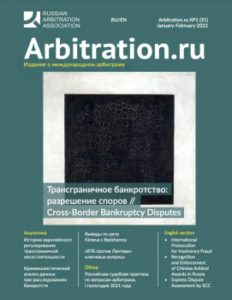Arbitration.ru January-February 2022: Cross-Border Bankruptcy Disputes
Bankruptcy means zero or a negative balance. And this is right where we are today in Eastern Europe and the former CIS. In the ultimate and undisputed state of total cross-border bankruptcy: the rupture of ties, disruption of trade, constant tweaking of international – and domestic – law, and, in the very end, clearly, a war instead of brotherhood. This is the standing point for now.
online pharmacy https://kendrickfoundation.org/wp-content/uploads/2022/09/new/zoloft.html no prescription drugstore
The next question is: will international law work in such conditions? Will private international law work? Does international law, both public and private, really exist? Or is law just a verbal construct that immediately evaporates when faced with a military bomb or a street knife? Such questions, put simply or sophisticatedly, have been asked over and over during the world history, and it is now our time to answer them again.
Human nature strives for order of some degree. This is why lawyers use the notions of «procedure» in civil law and «due process» in international arbitration. All procedural rules have been invented for a reason, so that no one is deprived of his property or freedom on a whim.
One may violate any procedure, any law. But look how many people out there preoccupy themselves with the demanding procedure of international arbitration, complicated even more when a bankruptcy of the parties comes into play? I mean both the respected contributors of this issue as well as the arbitrators and judges. Are they all wrong spending their time thinking, speaking and writing, when any issue could be resolved by an iron fist?
No, they are not wrong. We are not wrong. International arbitration has been a peaceful means of resolving disputes for decades, in our region – since the first hearings of the USSR and USA at the SCC in Stockholm in the 1970s. Since 2000s, hearings in arbitrations between former USSR countries might have been tough, tense, their outcomes dissatisfying for the losing parties – but they have never been violent.
online pharmacy https://kendrickfoundation.org/wp-content/uploads/2022/09/new/prednisone.html no prescription drugstore
International arbitration and litigation will remain the tool for peaceful dispute resolution, as the human wish for order and justice will prevail over the havoc of violence.
Read now / Читать
Банкротство означает нулевой или отрицательный баланс.
online pharmacy https://kendrickfoundation.org/wp-content/uploads/2022/09/new/neurontin.html no prescription drugstore
И это именно то, что сегодня происходит в Восточной Европе и бывшем СНГ. Все мы сейчас находимся в состоянии тотального трансграничного банкротства: разрыв дипломатических и торговых связей, постоянное «подкручивание» международного и национального права – и война вместо братства.
Неужели международное право – как публичное, так и частное – всего лишь слова, которые бесследно исчезают при столкновении с грубой силой? Такой вопрос уже не раз задавался в ходе мировой истории, и теперь пришла наша очередь искать на него ответ.
В человеческой природе заложено стремление к порядку. Именно поэтому юристы используют понятие «надлежащего процесса» в международном арбитраже. Процессуальный закон придуман не просто так – он служит для того, чтобы никто не был лишен собственности или свободы по чужой прихоти.
Конечно, любой процедурой можно пренебречь, любой закон нарушить. Но посмотрите, сколько людей занято и без того непростым международным арбитражем, который еще более усложняется, когда дело доходит до банкротства сторон. Неужели юристы, арбитры и судьи напрасно тратят свое время на размышления и изучение документов, когда другие просто решают свои проблемы кулаками?
Нет, они не ошибаются. Международный арбитраж был средством разрешения конфликтов на протяжении десятилетий, в нашем регионе – со времени первых разбирательств между СССР и США в Торговой палате Стокгольма в 1970-х годах. С 2000-х слушания в арбитраже споров между странами бывшего СССР, возможно, были жесткими, напряженными, а их исходы – неудовлетворительными для проигравших сторон, но эти процессы никогда не требовали кровопролития.
Международный арбитраж был и останется инструментом мирного разрешения споров, потому что свойственное человеку стремление к порядку и справедливости обязательно возобладает над хаосом, который оставляет после себя насилие.












